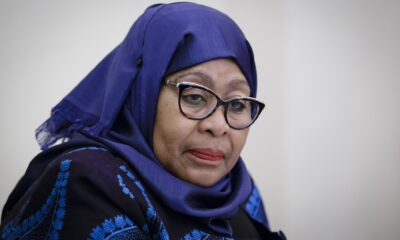Opinion
Women leadership in Kenyan politics is still void

The present women political representation in Kenya stands at 15 percent against Rwanda’s 56 percent, South Africa’s 42 percent, Tanzania’s 36 percent and Uganda’s 35 percent. This is an increase from 9.8 percent that was in the previous parliament. The increase is greatly attributed to the provision of the current constitution which was inaugurated in August 2010. The constitution recognizes women, youth, persons with disabilities and ethnic minorities as special groups deserving constitutional protection. It also reserved seats for the 47 women representatives.
Despite the affirmative action, women participation in the 2013 polls was low. No woman was elected as senator or governor. Women in National assembly are only has 5.5 percent of the 290 seats and of 1,450 ward representatives only 88 women (6 percent) were elected. This poor performance in politics is blamed on the country’s patriarchal culture and electoral system. Politics requires an enormous outlay of social capital and the process of political capital accumulation tilts in favour of men. This has rendered women sycophants of wealthy male politicians.
Charity Ngilu left a mark when she rose to the top of political heights as the first woman in Kenya to run for presidency in 1997 polls. Running against the then seating President Daniel Moi, Ngilu finished fourth. Former president Mwai Kibaki and former Prime Minister Raila Odinga were also in the race that Moi won. She was a trailblazer in the sub Saharan Africa and the entire continent that is known for its corrupt ‘Big Men’. Ngilu again announced in 2011 that she would run for the country’s top job in 2013 but her name was not the ballot. In what would have been her second stab at the presidency, her ambitions were flashed out in power brokering deals prior to the elections. She supported President Uhuru Kenyatta and later served in his administration as the Cabinet Secretary for Lands but was later kicked out on graft allegations.
There are many women in the current parliament but who stands out? All are sycophants to their political party chiefs. Some were caught up in euphoria and got to parliament like that; example is Nairobi Women representative, Rachel Shebesh who has made headlines not for her good work for the electorate but alleged affair with the Nairobi senator Gideon Mbuvi. Nominated senator Joy Gwendo is another woman leader in the middle of controversies, making headlines for failing alcoblow test and spending a night at Muthaiga police station. She has been at the centre of love a triangle where friends accused her of husband snatching.
The criteria for nominations need to be reviewed, some people get party nominations into parliament not for what they stand for but how close they are with party chiefs. Joy was found guilty of disrespecting the party that nominated her to parliament, The National Alliance (TNA). She was suspended for actively supporting the opposition but that suspension was later lifted after she brought in ‘tribal’ defence. I am a believer that the best losers and people who are positively popular with the electorate should be given the first priority in nominations.
The 2/3 gender debate is still on, women still want more representation but what are they doing with what they have so far? There is intense debate with a million questions surrounding the functions and mandates of women representatives. Many have expressed their dissatisfaction with women reps due to their perceived ineptness and complacency by some. They are more of a waste to taxpayer’s money. They are not any sufficiently eloquent and compelling in articulating the issues that got them the people’s vote. Women reps are Members of Parliament and they primarily should promote the interests of women and girl child within their counties.
The same affirmative action that saw the creation of positions of women representatives also recognises the rights of women as being equal in law to men, entitled to enjoy equal opportunities in political, social and economical spheres. It is the role of women reps to lobby and advocate for the rights, freedoms and interests of the women and girl child who are perceived as a ‘weaker sex’ to lift them to the standard where they should be at par with their male counter parts. We are yet to see a women rep who is actively doing this. Just like majority of their male counter parts, they are busy enriching themselves.
It’s a pity that after over fifty years of self governance we still lack any elected woman leader who stands for something like the late laureate prize winner, Wangari Maathai did. She was a stronger environmental and political activist. In women leadership today only the First Lady Margret Kenyatta is doing a commendable job, her ‘Beyond Zero Campaign’ is touching and changing lives across the nation. It’s improving maternal and child health outcomes in Kenya.
She organises First Lady Marathon annually to raise funds towards ‘Beyond Zero’ initiative. It is also working to accelerate the implementation of national plan towards the elimination of new HIV infections among children. As we urge for the number to rise from the current 15 percent, the elected women leaders must be seen doing something. Women organizations like Maendeleo Ya Wanawake (Women Development Organisation) should be revamped to champion the rights of women. The organisation is deep in slumber beds.
Kenya Insights allows guest blogging, if you want to be published on Kenya’s most authoritative and accurate blog, have an expose, news TIPS, story angles, human interest stories, drop us an email on [email protected] or via Telegram
-

 News2 weeks ago
News2 weeks agoTHE FIRM IN THE DOCK: How Kaplan and Stratton Became the Most Scrutinised Law Firm in Kenya
-

 Economy2 weeks ago
Economy2 weeks agoIran Demands Arrest, Prosecution Of Kenya’s Cup of Joe Director Director Over Sh2.6 Billion Tea Fraud
-

 Grapevine1 week ago
Grapevine1 week agoA UN Director Based in Nairobi Was Deep in an Intimate Friendship With Epstein — He Even Sent Her a Sex Toy
-

 Business2 weeks ago
Business2 weeks agoA Farm in Kenya’s Rift Valley Ignites a National Reckoning With Israeli Investment
-

 Business2 weeks ago
Business2 weeks agoKPC IPO Set To Flop Ahead Of Deadline, Here’s The Experts’ Take
-

 Politics2 weeks ago
Politics2 weeks agoPresident Ruto and Uhuru Reportedly Gets In A Heated Argument In A Closed-Door Meeting With Ethiopian PM Abiy Ahmed
-

 Investigations1 week ago
Investigations1 week agoHow Mexico Drug Lord’s Girlfriend Gave Him Away
-

 Business1 week ago
Business1 week agoSafaricom Faces Avalanche of Lawsuits Over Data Privacy as Acquitted Student Demands Sh200mn Compensation in 48 Hours




























